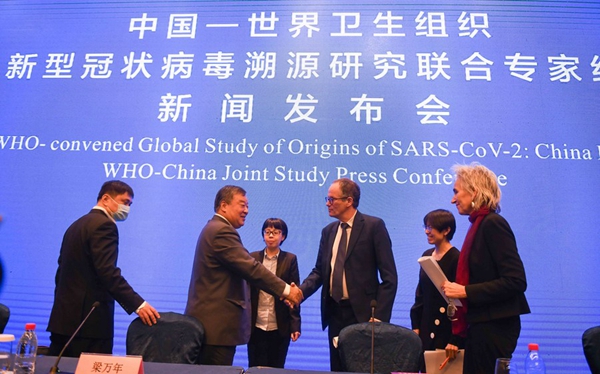
Liang Wannian (2nd L) and Peter Ben Embarek (3rd R), both members of the WHO-China joint study team, shake hands after the WHO-China joint study press conference in Wuhan, central China's Hubei province, Feb. 9, 2021. [Photo/Xinhua]
The World Health Organization (WHO) on Tuesday released a report on the global tracing of COVID-19 origins, following a joint research with China on issues including the pathways of the virus and future investigation in different countries.
A total of 34 experts from the WHO and China jointly conducted a 28-day research from Jan. 14 to Feb. 10 in Wuhan, China.
They made assessment of the likelihood of possible pathways. According to the report, COVID-19 introduction through an intermediate host is "likely to very likely," introduction through cold/food chain products is "possible," and introduction through a laboratory incident is "extremely unlikely."
The experts also put forward a series of recommendations for future researches: developing a comprehensive information database, conducting further retrospective and systematic research around earlier cases and possible hosts, and analyzing the different role of the cold chain in the possible introduction and spread of the virus.
China believes that the joint research will play a positive role in promoting global cooperation in COVID-19 origin tracing, a Chinese Foreign Ministry spokesperson said Tuesday.
Also on Tuesday, the WHO held a member state briefing on the report. During the briefing, Liang Wannian, a member of the WHO-China joint team, said that the novel coronavirus origin tracing research in China is part of the global study of origins of the virus, and it is the first step.
All the conclusions and recommendations in the report are based on a global perspective, and future research will not be limited to a certain area, Liang also said.
Although the process of finding the source of the virus is still ongoing, evidence and data included in this report still offer some key glimpse into it.
For example, the team "reviewed data from published studies from different countries suggesting early circulation" of the novel coronavirus, according to the report.
The findings showed that "some of the suspected positive samples were detected even earlier than the first case in Wuhan, suggesting the possibility of missed circulation in other countries," the report said, adding that "Nonetheless, it is important to investigate these potential early events."
Novel coronavirus origin tracing is about science, and it should be jointly carried out by scientists worldwide, said Chen Xu, head of the Chinese Mission to the United Nations in Geneva.
This joint research will play a positive role in promoting origin-tracing in many countries and regions around the world, and provide a scientific guide for the human race to better understand the virus, Chen added.




